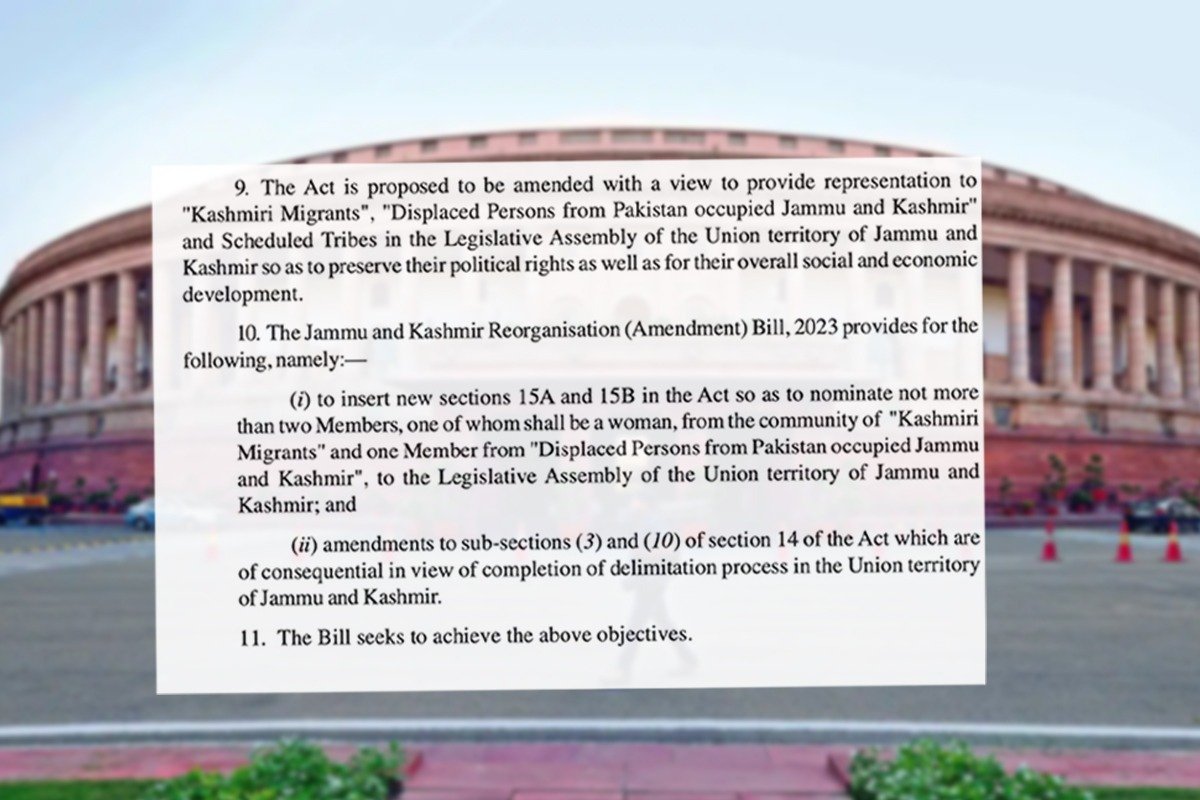NEW DELHI: In a significant move aimed at empowering the diverse minorities of Jammu & Kashmir, the Union Government introduced four key bills on quota and electoral reservation in Parliament. The bills tabled on Wednesday, seek to ensure representation and inclusivity in governance, fostering a sense of equitable participation for various communities in the region.
The first bill, introduced by Union Home Minister Amit Shah, aims to amend the Jammu and Kashmir Reorganisation Act, 2019. The primary objective of this bill was to reserve three seats in the Jammu & Kashmir Assembly. Two of these seats are intended for the Kashmiri Pandit community, one of which will be mandatorily set aside for a woman, while the third seat is to be allocated to refugees from Pakistan-occupied Jammu & Kashmir.
Centre introduces amendment to J&K Reorganisation Act, 2019, reserving one seat for PoK refugees in J&K Assembly.
𝗧𝗛𝗘 𝗡𝗘𝗪 𝗜𝗡𝗗𝗜𝗔𝗡 was the first to interview POK diaspora leader Sajjad Raja, who has long demanded representation for PoK people.https://t.co/xVCotasuSR
— The New Indian (@TheNewIndian_in) July 26, 2023
The second bill, also introduced by Home Minister Amit Shah, proposed amendments to the Jammu and Kashmir Reservation Act, 2004. Under this bill, the nomenclature “Other Social Castes” was to be replaced with “Other Backward Classes.” The amendment sought to reclassify certain communities for better representation and access to opportunities.
📜🏛️:2⃣ Amendment to J&K Reservation Act, 2004:
Proposes renaming "Other Social Castes" to "Other Backward Classes" in J&K Reservation Act. pic.twitter.com/ieE1MaALkh— The New Indian (@TheNewIndian_in) July 26, 2023
The third bill was presented by Union Tribal Affairs Minister Arjun Munda. This bill focused on amending the Constitution (Jammu and Kashmir) Scheduled Tribes Order, 1989. The proposed amendment sought to include the Paharis, Paddaris, Gadda Braman, and Koli tribes in the list of Scheduled Tribes in Jammu & Kashmir. The inclusion of these tribes aimed to provide them with enhanced socio-economic support and recognition.
The fourth and final bill was introduced by Union Minister for Social Justice and Empowerment, Dr. Virendra Kumar. This bill sought the inclusion of the Valmiki community in the list of Scheduled Castes of Jammu and Kashmir. By granting Scheduled Caste status to the Valmiki community, the bill aimed to uplift and empower them socially and economically.
The introduction of these bills comes in the wake of a recent delimitation process, which increased the number of seats in the Jammu & Kashmir Assembly from 107 to 114. Out of these, nine seats have been reserved for Scheduled Tribes (STs). The delimitation process faced criticism from regional parties such as the National Conference (NC) and the PDP, who raised concerns about the political implications of the alterations in constituency boundaries.
With the introduction of these bills, the Union Government seeks to strengthen the voice of marginalized communities in Jammu & Kashmir and promote social justice and inclusivity in the region’s governance. The bills will undergo rigorous parliamentary debates and discussions before being implemented, paving the way for a more representative and inclusive democracy in the state.
YOU MAY ALSO LIKE:










